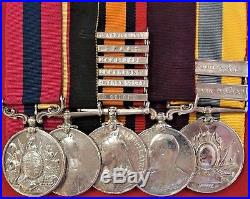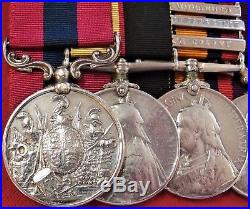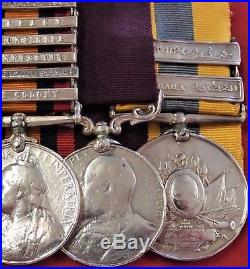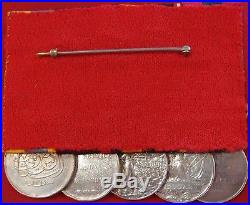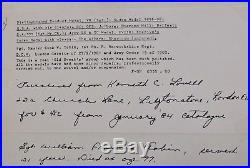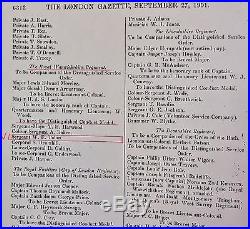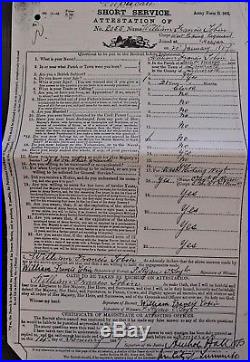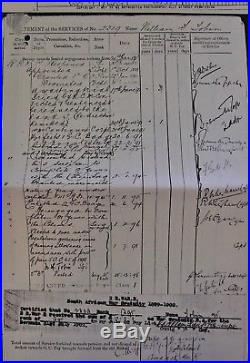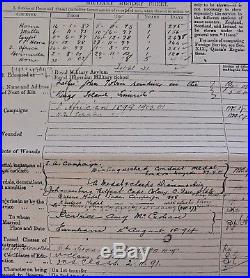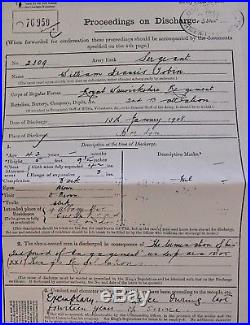A Boer War D. Group of five awarded to Sergeant W. Tobin, Royal Warwickshire Regiment, who won the Distinguished Conduct Medal for service during the Boer War. Medal group is court mounted as worn and includes the following awards: Distinguished Conduct Medal, V. Impressed named to 2309 SERGT: W. RL: WARWICK: REG T ; Queens Sudan 1896-98, engraved named to 230.. Army Long Service & Good Conduct Medal, E. Impressed named to 2309 SJT: W. London Gazette 27 September 1901. William Francis Tobin was born in Limerick, Ireland, and attested for the West Riding Regiment at the city of his birth, in January 1887. He transferred to the 1st Battalion Royal Warwickshire Regiment in May 1888. He advanced to Sergeant Major Cook in February 1896, and transferred in that rank to the 2nd Battalion in December 1898. Tobin served with the Regiment in Egypt, April 1897 – December 1898, and in South Africa, November 1899 – August 1901 awarded L. He was discharged 31 January 1908, having served 21 years, and died at Huddersfield in March 1944. 1 of only 7 D. S awarded to the Royal Warwickshire Regiment for the Second Boer War. The West Yorkshire Regiment during the Boer War. The 2nd Battalion sailed on the Gaul about 26th November 1899, and arrived at the Cape on the 16th December. The battalion went out as part of the Vth Division under Sir Charles Warren, but when that general and six of his battalions went round to Natal to assist Sir Redvers Buller, the remaining twothe 2nd Warwicks and 1st Yorkshire Regimentwere landed at Cape Town. The Warwicks were ordered to the Britstown-De Aar district, the Yorkshires going to the central district, then the sphere of General French. When Lord Roberts reorganised at Modder River prior to his eastern advance, the 18th Brigade was formed under Major General T E Stephenson, then colonel of the Essex, the battalions being the 2nd Warwicks, 1st Yorkshire, 1st Welsh, and 1st Essex; but ill-luck again followed the Warwicks, as they could not be spared from the lines of communication until the Militia regiments sailing from England in January 1900 had arrived. No doubt the rising in the Prieska district contributed to keep them in the south, consequently they missed Paardeberg and the fighting at Poplar Grove and Driefontein. In these circumstances it is more convenient to treat the work of the brigade under the Yorkshire Regiment. It will be remembered that the situation in the west of Cape Colony became so serious in February and March 1900 that Lord Kitchener was despatched to organise a force to operate in the Britstown, Carnarvon, and Prieska district. That force consisted of the Warwicks, part of the City Imperial Volunteers, some New Zealanders, Canadians, Yeomanry, and Militia. The rising having been put down, the Warwicks joined the main army in April, and were thereafter in the 18th Brigade in the northern advance to Pretoria, in the battle of Diamond Hill, 11th June 1900, and in the last great movement towards Koomati Poort. When the advance to Pretoria was commenced the Xlth Division under General Pole-Carew was formed of the Guards Brigade and the 18th Brigade. See 3rd Grenadier Guards. In the advance towards Koomati Poort the Xlth Division had fighting, about 24th to 27th August, at the north or right of the Boer positions, near Belfast; but General Pole-Carew could not make progress there, and it was only after General Buller had driven the enemy from the key at Bergendal that the Xlth Division could move forward. The Warwicks had about 20 casualties in this fighting. After Koomati Poort had been occupied the battalion was chiefly employed in the Eastern Transvaal, being posted about Koomati Poort, Avoca, and Pan for a long time. At the Poort the battalion was much depleted by fever. The battalion was sent as escort with prisoners to Bermuda before the close of the war. Ten officers and 16 non-commissioned officers and men were mentioned in Lord Roberts’ final despatch. Four officers gained mention by Lord Kitchener during the war. The Mounted Infantry companies of the 3rd and 4th Battalions arrived in South Africa in 1901, and saw a great deal of fighting. No less than 7 non-commissioned officers and men of the 3rd Battalion, and 1 of the 4th, gained mention in despatches during the war; and in Lord Kitchener’s final despatch 6 officers and 2 men of the Warwicks were mentioned. Please view our guide on spotting fake militaria. We list militaria and coins weekly. We provide quality mounted medals, badges and historical research. We can mount your miniature or full size medals, ribbon bars or supply replacement ribbons or badges. We can also conduct military research on your behalf and value cherished objects with a current market or insured value. 2/135 Russell St, Morley, WA. We run two specialist military auctions per year, details of which can be found on our website. Items are accurately described & photographed. Additional costs for this standard service will be added for this service based on publicly available Australia Post rates. Please note, these items are located and will be posted from Australia. We appreciate fair feedback from you once you receive the item. We aim to give you, the customer our best customer service. The item “PRE WW1 DCM BOER WAR GALLANTRY & SUDAN CAMPAIGN MEDAL GROUP WARWICKSHIRE REGT” is in sale since Monday, September 11, 2017. This item is in the category “Collectables\Militaria\1914 – 1918 (WWI)”. The seller is “jb_military_antiques_14″ and is located in 2/135 Russell St, Morley, Perth, WA. This item can be shipped worldwide.
- Authenticity: Original
- Era: 1800s
- Country: ENGLAND
- Product Type: Medals
- Campaign: Boer War
